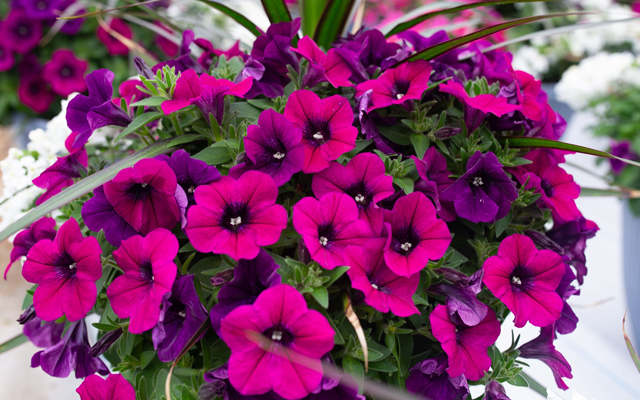Do you want your petunias to keep their vibrant colors all summer long? With proper care, petunias will produce blooms from the time they are planted until a hard frost.
Here are some helpful tips to follow to keep your petunias looking good throughout the season:
- Sunlight: Petunias thrive in full sun, so make sure they receive at least six hours of direct sunlight per day. However, during heat waves, they may benefit from some afternoon shade to protect them from scorching heat if you have the ability to move them.
- Watering: Petunias prefer consistent moisture, so water them regularly but don’t drown them. Overwatering can lead to leggy plants. Keep the soil moist, not soggy. Avoid letting the soil dry out completely between waterings. Water at the base of the plant rather than overhead to minimize the risk of fungal diseases. Petunias in containers will likely need daily watering. If you notice your petunias looking wilted – water them!
- Fertilizing: Feed your petunias with a balanced, water-soluble fertilizer every two to three weeks or as directed on the product label. Look for fertilizers specifically formulated for flowering plants to promote healthy growth and abundant blooms. Adding compost to the soil is always beneficial to plants.
- Deadheading: Regularly remove spent flowers by pinching or cutting them off. You need to deadhead the petunia bloom behind the base of the bloom to prevent seed formation. Deadheading properly not only makes the petunia plant look more attractive, it encourages the plant to produce more blooms and prevents seed formation, which can divert energy away from flower production.
- Pruning: If your petunias become leggy or overgrown, you can prune them back to maintain a more compact shape. Trim back the stems by a third to half their length, making the cuts just above a leaf node or lateral branch.
- Pests and Diseases: Regularly inspect your petunias for any signs of pests, such as aphids or caterpillars, and take appropriate measures to control them. If the infestation is not too severe, you can remove pests with a strong spray of water. Also, watch out for common diseases like powdery mildew or gray mold. If you notice any signs of disease, treat the plants with appropriate fungicides or take preventive measures like providing good air circulation.
- Regular Ground Maintenance: Keep the area around your petunias clean and weed-free. Remove any fallen leaves or debris that can harbor pests or diseases.
- Container Care: If you’re growing petunias in containers, ensure they have adequate drainage and water them more frequently, as potted plants tend to dry out faster than those in the ground.
By following these tips, you can help your petunias thrive and look their best throughout the summer season.

